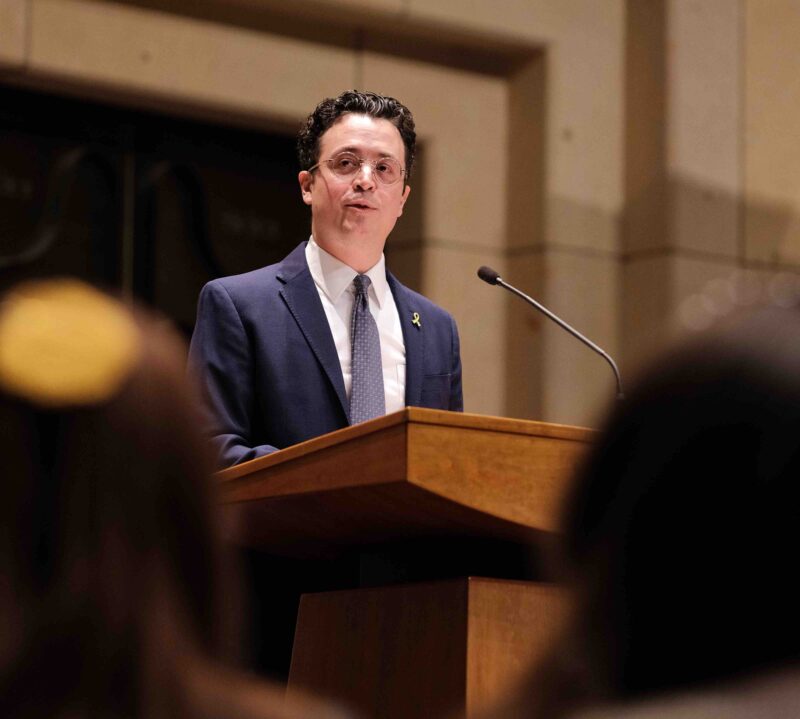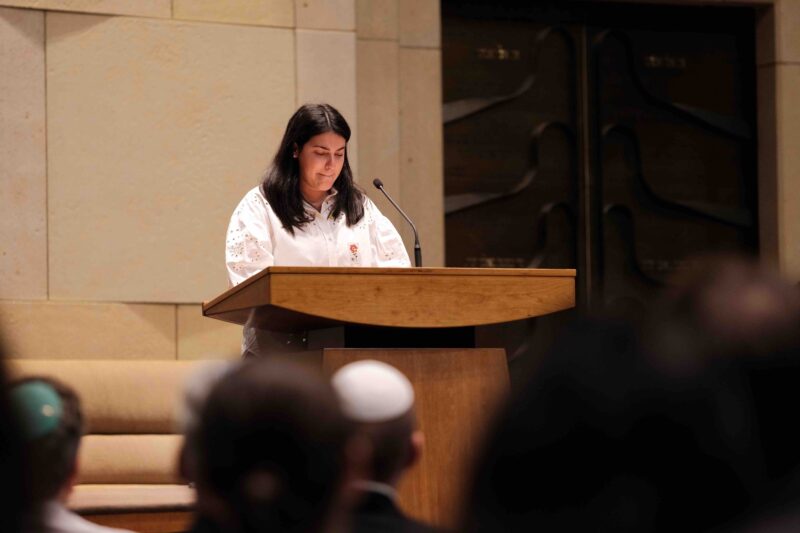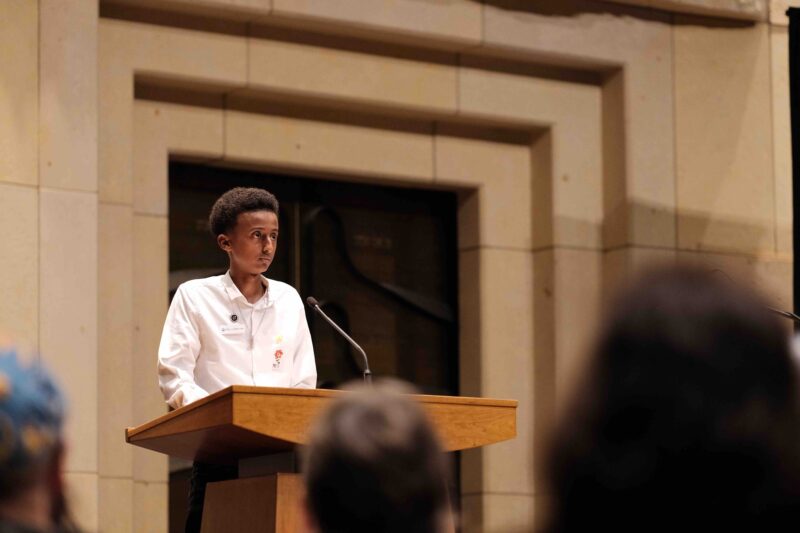Adath Jeshurun Congregation’s sanctuary burst at the seams on Monday night as roughly 1,100 members and friends of the Twin Cities Jewish community – with another 1,700 people watching the livestream – gathered to commemorate and mourn the one-year anniversary of the Oct. 7 Hamas attack on southern Israel.
“This evening, we carry the events of one year ago…when terrorists invaded, torched, abducted, mutilated, abused, uprooted and changed life forever,” said Rabbi Aaron Weininger, Adath’s senior rabbi.
“Tonight, we also carry the heaviness of our grief,” he said. “All of this is too much for any one person or any one Jewish community to carry.”

Rabbi Aaron Weininger (Lev Gringauz/TC Jewfolk)
Speakers at the event included Jewish clergy, lay leaders, and both American Jewish and Israeli members of the Twin Cities community. A variety of elected officials and people running for office attended, but none spoke at the event.
Attendees included Lt. Gov. Peggy Flanagan (who may be Minnesota’s next governor if the Harris/Walz presidential ticket wins in November); Sen. Amy Klobuchar; Rep. Angie Craig; and many state lawmakers, like Senate Majority Leader Erin Murphy and Speaker of the House Melissa Hortman.
Speakers recalled the brutality of last year’s attack, during which 1,200 people were killed – many after being raped, tortured, and mutilated – and 250 hostages were taken by Hamas back to Gaza. The attack plunged Israelis and Jews around the world into a near-constant state of shock and mourning.
But the attack was also notable for the heroism of many Israelis who risked their lives to save others.
Noa Rosenzwieg, an Israeli working as the Israel Center manager at the Minneapolis Jewish Federation, spoke about Ben Shimoni, a childhood friend of hers who had been at the Nova Music Festival during Hamas’ attack.
“When shots started to ring out, Ben went to his car. Along the way, he gathered up as many people as can possibly fit in his car,” Rosenzweig said. “Ben was able to get them all to a safe space. Everyone got out of the car – except for Ben.”
Shimoni repeated his rescue drive three more times, saving others even as his girlfriend, family, and the people he saved begged him not to go back.
On the last journey, he and the women he was driving to safety were ambushed by Hamas gunmen. Shimoni’s destroyed car was found on the side of the road, and his body recovered days later.
“I don’t think there is a more tragic, yet fitting, example of helping your neighbor than the heroism that Ben displayed on October 7,” Rosenzweig said. “He put himself last and put the life of others first.”
Hamas’ attack sparked a wider war between Israel and Hamas – and now Israel and Hezbollah – that has brought destruction and displacement to civilians in Israel, Gaza, and Lebanon.
Antisemitism around the world has also skyrocketed, with Jewish institutions tightening security and persevering amid vandalism and threats of violence.

Noa Rosenzwieg tears up as she remembers her childhood friend, killed by Hamas on Oct. 7 while rescuing others (Lev Gringauz/TC Jewfolk)
At the same time, American Jews embarked on a massive fundraising and volunteer campaign to assist Israelis. Many Minnesota Jews have traveled to Israel to, among many activities, help the agriculture industry by picking and packing food, and preparing supplies for Israeli soldiers.
Michael Stern, who went on the Minneapolis Jewish Federation’s Tikvatenu II trip to Israel in July, recalled helping to clean out the destruction of Kibbutz Holit, one of the southern Israeli communities attacked by Hamas. Fifteen people were killed, and several others taken hostage by Hamas from the community.
Stern volunteered under the direction of a 62-year-old resident of Holit, the son of Holocaust survivors, who had returned to the kibbutz with five others in February after surviving the Oct. 7 onslaught.
The man “gracefully assumed the role of head ground’s keeper, a tribute to a close friend who was murdered on Oct. 7, and as he guided us, he put us to work clearing debris, pulling weeds and restoring beauty where we could,” Stern said.
“We are now forever connected to him and Holit – we are still here, telling the story and honoring the memories of those who lost their lives that day, as well as those who actually survived,” he said. “The souls live on in all of us as we continue to rebuild as Jewish people.”
Many connections tie together Twin Cities Jewry and Israelis, including some that go back many years. Rebecca Povarchuk, a participant on the St. Paul Jewish Federation’s solidarity mission to Israel in March, recalled visiting the northern Israeli kibbutz where St. Paul’s 2006 Israeli emissary, Gali, now lives.
On Oct. 7, Gali knew that her community – which previously served as an evacuation point for Israelis from the south – needed to be ready to welcome and care for Israelis fleeing Hamas’ attack.
“Gali began organizing her community immediately, and some of the [southern] families made it to her, plus additional evacuees from the northern border,” Povarchuk said.
“But some of those she was gathering mattresses and food and clothes for, didn’t make it – like the elderly woman she spoke to, held for nine hours in her shelter, who was murdered before she could go north,” she said.
The Minneapolis Jewish Federation has raised $12.8 million in aid for Israel, with the St. Paul Jewish Federation raising $1.4 million – part of a total $833 million raised by the Jewish Federations of North America, the umbrella group for local federations.
Despite many Jews hoping that the aftermath of Oct. 7 would be over in a few months, one year later it feels like little has changed.
A common refrain among many Israelis and American Jews is that it feels next to impossible to commemorate Oct. 7, and to begin to move forward from it, when the event that started one year ago is still ongoing. Every day since has felt like a demented ”Groundhog Day” loop with no end in sight.
Hamas has been degraded after extensive fighting with Israel, and a hostage deal in November 2023 saw the terrorist group release 105 people. But Hamas is still entrenched in Gaza while holding onto 101 hostages – many of whom are feared to be dead – and continues to attack and even to shoot rockets at Israelis.
Hamas has rejected numerous hostage and ceasefire deals over the past year, while Prime Minister Benjamin Netanyahu is accused by Israeli hostage families, heads of the Israel Defense Forces, and security agencies alike of sabotaging hostage negotiations to protect his extremist right-wing government.
Israel’s war on Hamas – which is embedded among civilians in Gaza – has killed over 40,000 Palestinians, according to the Hamas-run Gaza Health Ministry, which does not differentiate between civilian and Hamas militant deaths. Much of Gaza’s civilian infrastructure has also been destroyed by Israel in its pursuit of Hamas, as Palestinians contend with a severe lack of food and the spread of disease.
Netanyahu, the Israeli government, and the IDF have yet to outline or commit to a post-war plan for Gaza that does not involve continued Israeli entrenchment and control of the area. Meanwhile, the Israeli economy is in crisis, and Israelis are perhaps more divided than ever, as Israel now attempts to root out Hezbollah’s threat against northern communities.
Yedidya Yasu, the Israeli shaliach, or emissary, for the St. Paul Jewish Federation, put to words the rage Israelis feel against Hamas and Hezbollah – likening them to Amalek, a biblical enemy that ambushed the Israelites in a surprise attack.
“Amalek is attacking families in their homes, young souls who wanted to dance and celebrate, and the brave soldiers who paid [with] their lives, as well as many more innocent people,” Yasu said.
“Amalek sees no difference between Jews and non-Jews, black or white, if you’re Israeli or not Israeli at all, if you’re a soldier or innocent person – Amalek does not have human morality, and we must remember that,” he said.
In the Torah, God commands the Israelites to “remember what Amalek did to you,” and to strive for the extinction of the nation of Amalek. In today’s world, that means comparing Hamas to Amalek has been controversial – critics have seen that rhetoric as justifying total war on all Palestinians in Gaza.

Yedidya Yasu (Lev Gringauz/TC Jewfolk)
For generations, Amalek has been shorthand for the worst enemies of the Jewish people. After the Holocaust, “remember what Amalek did to you” was a rallying cry for surviving Jews to record their experiences at the hands of the Nazis.
Yasu came to Minnesota shortly after Oct. 7, and as he put it, “It did not take long to see that Amalek was here, too, but in a new form.”
He referenced a refrain sometimes heard from American anti-Israel activists: “I’m not antisemitic, I’m just anti-Zionist.”
For Yasu, there is no difference. “What does that really mean? It means asking me to deny my own existence, to reject my homeland, to abandon the sense of who I am,” he said. “But my story, like all of ours, is a story of survival.”
Yasu, an Ethiopian Jew, said his family could trace itself back 15 generations, spanning more than 600 years. In all that time, they dreamed of returning to the land of Israel. That return, reaching its height a few decades ago, was full of strife, difficulty, and death as Ethiopian Jews faced long treks and rampant antisemitism in the attempt to reach the modern state of Israel.
“Over the years, [Ethiopian Jews] faced Amalek many times – in the forest and the jungles of Ethiopia, and in the deadly desert of Sudan, but they did not give up the same spirit and strength that brought me here today,” Yasu said.
Jews and Israelis “are not going anywhere,” he said. “Amalek has failed thousands of times and it will continue to fail…we are people who don’t give up, [and] we will keep standing together, keep standing as a community – strong.”
The Oct. 7 commemoration, titled “Shivah of October,” was co-sponsored by the Minneapolis and St. Paul Jewish Federations; Minnesota Rabbinical Association; Minnesota Cantor’s Association; Adath Jeshurun; TC Jewfolk; and the Jewish Community Relations Council of Minnesota and the Dakotas.
“Shivah” references both the number seven in Hebrew, and the mourning period of seven days directly after someone has died.
Cantors from Twin Cities synagogues sang various prayers between speakers, including “Acheinu,” a prayer for the release of hostages that has become a rallying cry among American Jews.
Expanded prayers for Israel, the hostages, and the Israeli Defense Forces were also said, along with Israeli poetry commemorating the post-Oct. 7 trauma and survivor’s guilt. Speakers regularly ended their remarks with calls of Am Israel Chai, “the people of Israel live,” a rallying cry for Jewish pride and survival.
The commemoration event ended with the singing of “God Bless America” and “Hatikvah,” Israel’s national anthem, and a shofar blast by Rabbi Matt Goldberg, assistant rabbi at Beth El Synagogue. After the blast, the crowd silently left the sanctuary in a high holiday-inspired twist on the moment of silence that often crops up during memorial events.
This year’s commemoration comes at a unique time: The secular anniversary of Oct. 7 lands squarely between Rosh Hashanah, the Jewish new year, and Yom Kippur, the day of atonement, during the period of the high holidays. This period is referred to as the Yamim Nora’im, or the Days of Awe.
The Jewish calendar anniversary of Oct. 7, meanwhile, comes later this month on the joint holiday of Shemini Atzeret and Simchat Torah – considered to be among the most joyful Jewish holidays. Simchat Torah literally means “joy of Torah,” when congregations dance with and celebrate the scrolls at the heart of Jewish life.
Israelis have made a conscious effort to remember the Hamas attack by its secular date, so as not to taint the joyful holidays with mourning.
But the Jewish anniversary still resonates with many, leading congregations to have a careful balancing act between the high holidays and Oct. 7 commemoration this year.
“We find ourselves in a moment of great uncertainty about the world and escalations of violence, and we find ourselves commemorating a year of mourning where death continues and so many innocent lives have been lost or are at risk of imminent death on all sides,” said Rabbi Ricky Kamil, the justice task force organizer at Temple Israel and co-chair of the Minnesota Rabbinical Association.
“We come together to feel as a community, to mark this solemn occasion with our collective anguish,” he said, “and in the memory of those lost; honor for the heroes; safety and return for the hostages; resilience for all of us; and a prayer for a better world.”


















1 comment